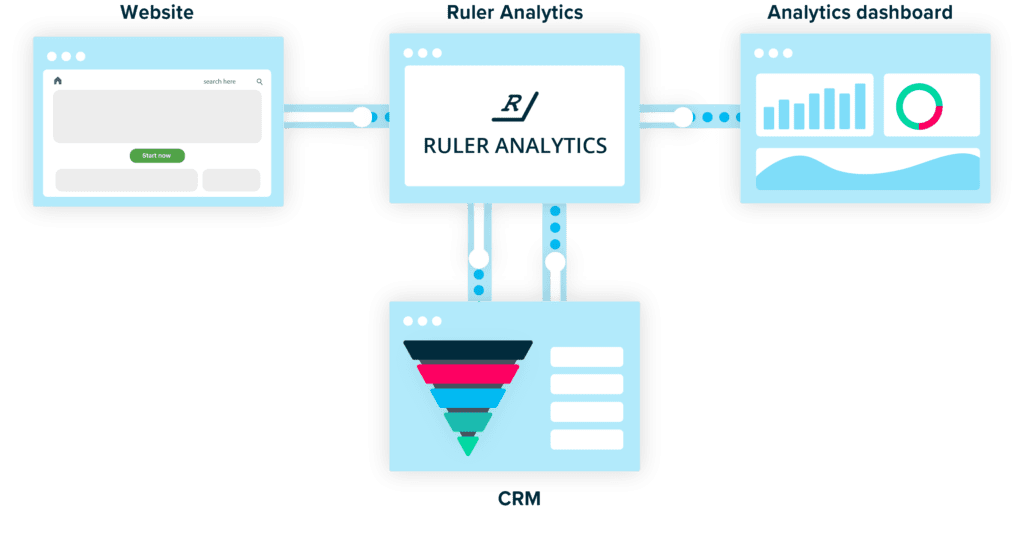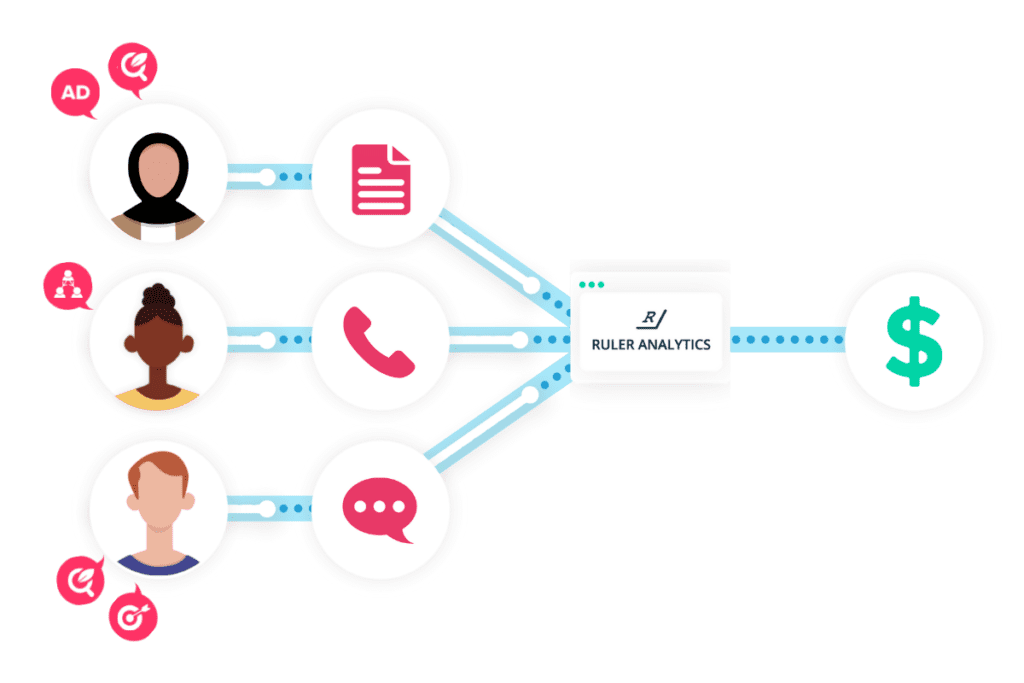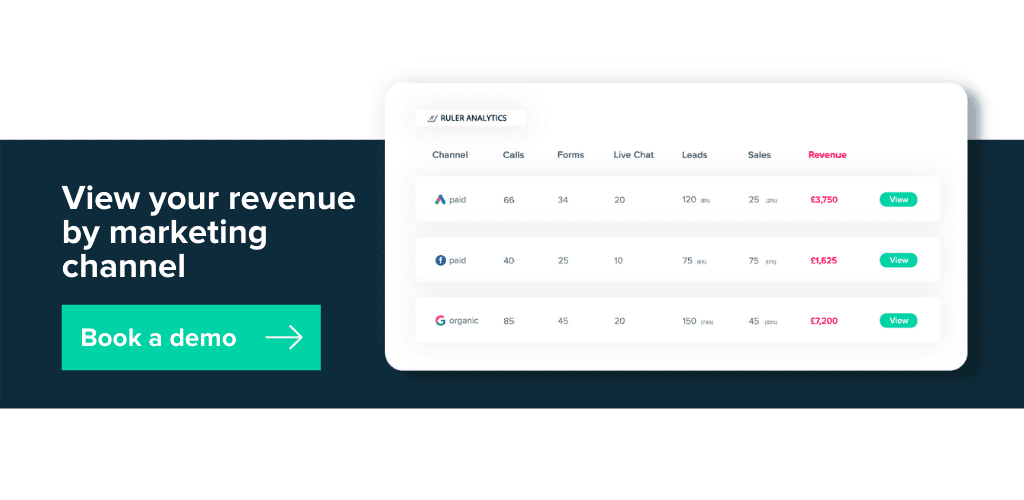Mastering Google Ads is a skill. PPC campaigns can make or break your business, and as available features have grown, so has its potential.
Google Ads’ latest feature, smart bidding, is being touted as a revolutionary tool to improve your conversion rate while reducing your cost per lead. Sound good?
We think so! Ruler Analytics recently became a Google Partner meaning both businesses are working closely to simplify conversion tracking for Google Ads users.
So, we spoke to Odolena Kostova, Account Manager for Google, to find out more about how we can do just that. She ran us through what smart bidding is, and how you can use it to take your pay-per-click advertising to the next level.
Keep reading to learn:
Let’s get stuck in.
“Smart bidding is a function offered by Google Ads to allow advertisers to use machine-powered automated bidding.
Smart bidding allows advertisers to focus on set strategies, from conversions to return on ad spend (ROAS). Google takes over the bidding process, using factors like:
These factors allow Google to put your ads to users with higher search intent, who are, mathematically, more likely to convert.”
There are a number of strategies that smart, automated bidding can support with.
To simplify it, here’s a short table of the main strategies used by businesses for smart bidding:
Goal |
Bid Strategy |
| Increase site visits | Maximise Clicks is a bid strategy you can use to help get as many clicks as possible within your budget.
|
| Increase ad visibility | Target Impression Share is a bid strategy to automatically bid so that your ad is shown at the top of the page.
|
| Get more conversions by using your target CPA | Target CPA automatically sets Search or Display bids to help get as many conversions as possible at the target cost-per-action (CPA) you set. Some conversions may cost more or less than your target.
|
| Meet a target return on ad spend (ROAS) | Target ROAS automatically sets bids to drive conversions at a value close to your target ROAS. You can set each conversion up with a separate value.
|
| Get more conversions while spending your budget | Maximise Conversions automatically sets bids to help you get the most conversions for your campaign within your set budget.
|
| Get more conversion value while spending your budget | Maximise Conversion Value automatically sets bids to help you get the most conversion value for your campaign while spending your budget.
|
“The short answer? Yes!
Not only is manual bidding time-consuming, but it’s also no longer as effective as smart bidding.
Google Ads’ smart bidding operates a number of strategies as mentioned above. Of course, each of these have different performance success.
We have found that campaigns to maximise conversions (ie, as many conversions using a daily budget) saw a 20% increase in conversions for the same cost per conversion, by using smart bidding.
Meanwhile, targeted cost per acquisition via a specific goal (eg. form submissions), saw a 31% increase in conversions for the same cost per conversion.
Lastly, campaigns using Target ROAS saw a 35% increase in conversion value compared to manual bidding campaigns.
Of course, every business will see different results, but this is a strong argument to at least test out automated bidding with Google Ads.”
“Honestly, depending on your objective, any business could make the most out of smart bidding.
Of course, different strategies will suit different businesses, but pretty much everyone can benefit. We tend to look at businesses that are below 90% of impression share on their advertising. This gives smart bidding an opportunity to optimise.
There’s no minimum spend with smart bidding either. All you need to think about is, how much does a conversion cost?
If your average cost per conversion is £20 and your daily budget is £10, then you will not get the maximum out of smart bidding and your conversion volume is likely to drop. But, for someone who is willing to grow at a certain cost per conversion, then the scope is limitless. You can cap your spend on your cost per conversion (target CPA), as opposed to limiting yourself to a daily budget (Maximise Conversions). This means that Google can be very competitive on terms that it has learned will work.
Since Google, and your marketing attribution model, will know which keywords and conversions bring the highest value, it can optimise for even higher quality leads. So smart bidding becomes a self-perpetuating cycle of data and results.”
“If you’re using smart bidding, then it’s simple.
Just look at these four factors and you will be able to optimise your pay-per-click using smart bidding:
When setting up your Ads campaigns, use broad keywords and avoid over-segmentation. With manual bidding, segmentation and thorough keyword research is essential. However, with smart bidding, you can let Google do the hard work for you.
Since smart bidding works well for both online and offline conversions, marketing attribution is essential. Smart bidding only works with data. The more data you can provide on your inbound leads and conversions, the better.
When deploying smart bidding, ideally avoid first or last-click attribution models. From a PPC perspective, it doesn’t give the full picture. Given that every business will use PPC ads to drive traffic at a different part of the buyer’s journey, we recommend multi-touch attribution models like data-driven attribution, position-based or linear.
Data-driven attribution is a Google model, but it’s only available to advertisers with more than 600 conversions and 15,000 clicks p/m. You need a model that can track every step.
Offline conversion tracking allows Google to see which keywords are leading to offline sales, so marketing attribution is essential (if you’re not purely eCommerce), to ensure you’re getting the most out of the smart bidding system.
Smart bidding works equally well for online and offline measurement. The offline conversion import is important for those who rely on leads. Google smart bidding can even take offline conversions like store visits into account.
But remember, for all strategies (except target ROAS), you can begin smart bidding without any historic data. Just supply as much data as possible when setting up and be aware that it will take Google a few weeks to learn during which performance may vary. The more conversions there are in the account, the faster Smart Bidding will learn.
Make sure you’re using all the creatives Google has to offer. Testing is essential for both your learning and for Google’s.
Every ad campaign should have a minimum of two extended text ads and one responsive search ad. You can’t know what is working best without testing various formats.”
For businesses using offline conversion methods like email, or phone calls, then smart bidding won’t have a full picture of your conversions without marketing attribution.
Marketing attribution models, like Ruler, allow you to connect the dots between your sales and marketing data for both online and offline conversions.

Marketing attribution models can help you achieve your sales and marketing goals. Here’s how it could help:
As Odolena mentioned above, Google’s smart bidding tool needs data. Marketing attribution tracks every anonymous journey on your website. Once a user converts, whether that’s by form, phone or live chat, Ruler Analytics fires that data into your CRM.
Then, when that lead converts into a sale, Ruler Analytics will fire all of the revenue data back into Google Ads.
What exactly does that mean?
Well, it means Google Ads can get a real cost per lead and cost per conversion now that it’s now including offline conversions. With that, it can be more aggressive bidding on the terms that really matter.
Not convinced smart bidding is right for your business? With marketing attribution, you can track every touchpoint a user has with you. Whether that’s organic social, email, or paid advertising. You can even track the impact of your ad campaigns, and keywords.
So, if you’re testing out smart bidding, you’ll be able to see exactly what role it’s playing in your customers’ buyer’s journeys. Buyer journeys aren’t one touchpoint.
Related: Marketing touchpoints: a complete guide
Marketing attribution allows you to monitor every touchpoint and understand how each plays its role. While you might not see paid ads converting on a first, or last-click basis, you’ll never know the full role it plays without proper marketing attribution. Particularly so if you’re tracking offline conversions.
Related: How to improve your ROAS using Ruler
Marketing attribution allows you to see what channels, campaigns and even keywords work best for driving revenue. Forget reporting in clicks, impressions and leads.
Using marketing attribution, you can connect your sales and marketing data and make informed decisions about your strategy and campaigns to maximise results.
Ruler Analytics works as follows:
1. Ruler tracks each anonymous visitor to the website over multiple sessions, traffic sources and keywords.
2. When a visitor converts, data is captured via form, call tracking or live chat on your website.
3. Ruler matches the real user’s details with their marketing touchpoints and fires this to your CRM. Marketing data includes channel, source, campaign, keyword and/or landing page.
4. Ruler’s attribution solution allows you to analyse the impact throughout the entire sales cycle. Once the opportunity is closed into revenue, Ruler passes this data back to your Google Analytics and paid media tools so that you can report on revenue.

Marketing without proper understanding of its impact on revenue means you’re essentially marketing blind. Integrating Ruler Analytics with your website, CRM and Google Ads means you can unlock powerful data.
Interested in learning more about how Ruler Analytics can help you get the most out of your paid campaigns?
Book a demo today to see how the platform works to connect your sales and marketing, providing you with powerful tangible insights you can use. Find out more about getting started with smart bidding here.
